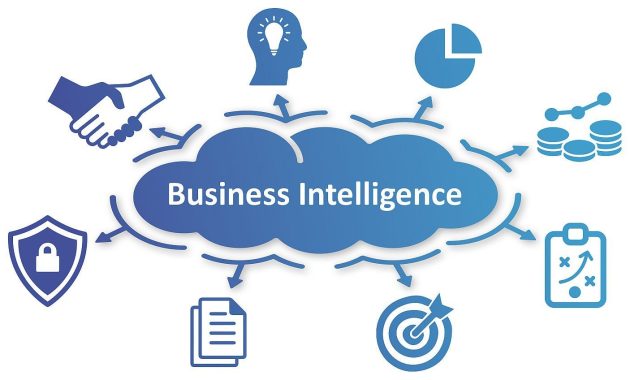
How to Use Business Intelligence Software to Skyrocket Business Growth
In today’s data-driven world, businesses are constantly seeking ways to gain a competitive edge. One of the most effective tools for achieving this is business intelligence (BI) software. This article explores how to use business intelligence software to skyrocket business growth. We will delve into its functionalities, benefits, and practical applications. Understanding BI software is crucial for making informed decisions. These decisions drive growth and improve overall business performance. The power of data is undeniable. BI software helps unlock this potential.
Understanding Business Intelligence Software
Business intelligence software is a category of applications. It collects, processes, and analyzes raw data. The goal is to transform this data into actionable insights. These insights help organizations make better strategic and operational decisions. BI software integrates data from various sources. These sources include databases, spreadsheets, and cloud-based applications. The software then presents the data in easy-to-understand formats. These formats include dashboards, reports, and visualizations. This allows users to quickly identify trends and patterns. The core function of BI software is data analysis. It provides a comprehensive view of business performance. This view is accessible across different departments and levels.
Key Features of Business Intelligence Software
Effective BI software offers a range of features. These features are critical for successful implementation. Key features include:
- Data Integration: The ability to connect to various data sources is essential. This ensures a unified view of all relevant information.
- Data Warehousing: Storing large volumes of data in a centralized repository. This optimizes data retrieval and analysis.
- Reporting and Dashboards: Creating customized reports and interactive dashboards. These tools visualize key performance indicators (KPIs).
- Data Visualization: Presenting data through charts, graphs, and maps. This makes it easier to understand complex information.
- Advanced Analytics: Employing statistical methods and machine learning. This uncovers hidden insights and predicts future trends.
- Mobile Access: Providing access to data and reports on mobile devices. This allows for real-time decision-making on the go.
Benefits of Using Business Intelligence Software
The advantages of implementing BI software are numerous. These benefits contribute directly to business growth and efficiency. Some key benefits include:
- Improved Decision-Making: BI software provides data-driven insights. This leads to more informed and effective decisions.
- Increased Efficiency: Automating data analysis and reporting processes. This frees up employees to focus on strategic tasks.
- Cost Reduction: Identifying areas for cost savings. This is achieved through better resource allocation and process optimization.
- Enhanced Customer Experience: Gaining insights into customer behavior and preferences. This allows for improved customer service and targeted marketing.
- Competitive Advantage: Understanding market trends and competitor activities. This enables businesses to adapt and stay ahead.
How to Implement Business Intelligence Software
Implementing BI software involves several key steps. Careful planning and execution are crucial for success. The process typically includes:
- Defining Business Objectives: Clearly identifying the goals and objectives. These goals should be supported by the BI implementation.
- Selecting the Right Software: Choosing the BI software that best fits your needs. Consider factors like scalability, features, and ease of use.
- Data Integration and Preparation: Connecting to all relevant data sources. This involves cleaning, transforming, and preparing the data for analysis.
- Dashboard and Report Development: Creating customized dashboards and reports. These tools should present the data in a clear and actionable manner.
- Training and Adoption: Training employees on how to use the software. This is critical for ensuring widespread adoption and effective use.
- Ongoing Monitoring and Optimization: Continuously monitoring the performance of the BI system. This involves making adjustments as needed to optimize results.
Real-World Examples of BI Software in Action
Many businesses have successfully used BI software to drive growth. These examples illustrate the impact of BI in different industries:
- Retail: Retailers use BI to analyze sales data. They identify trends and optimize inventory management. This leads to increased sales and reduced waste.
- Healthcare: Healthcare providers use BI to analyze patient data. They improve operational efficiency and enhance patient care.
- Manufacturing: Manufacturers use BI to track production data. They optimize processes and reduce downtime. This improves overall productivity.
- Finance: Financial institutions use BI to analyze financial data. They identify risks and improve investment decisions.
- Marketing: Marketers use BI to analyze marketing campaign data. They optimize marketing spend and improve ROI.
Choosing the Right Business Intelligence Software
Selecting the right BI software is crucial for success. Several factors should be considered during the selection process:
- Scalability: Ensure the software can handle your current and future data volume.
- Ease of Use: Choose software that is user-friendly. This maximizes adoption across your organization.
- Integration Capabilities: The software should integrate with your existing systems. This ensures seamless data flow.
- Reporting and Visualization Features: Evaluate the reporting and visualization capabilities. They must meet your specific needs.
- Cost: Consider both the initial cost and ongoing maintenance costs. Ensure it fits within your budget.
- Vendor Support: Assess the vendor’s support and training offerings. This is crucial for long-term success.
How Business Intelligence Software Skyrockets Business Growth
Business intelligence software is a powerful tool. It helps businesses skyrocket business growth. By providing actionable insights, it enables informed decision-making. This leads to improved efficiency, cost reduction, and enhanced customer experiences. Implementing business intelligence software is a strategic investment. It positions businesses for long-term success. The ability to analyze data is essential. It drives growth in today’s competitive landscape. Using business intelligence software is a key strategy. This strategy helps businesses stay ahead. It allows them to make data-driven decisions. These decisions directly impact growth. The core function of business intelligence software is data analysis. This function provides a comprehensive view. This view is key for business performance. This view is accessible across all levels. Business intelligence software helps businesses understand their customers. It also helps them optimize operations. This leads to higher profitability. The use of business intelligence software is transformative. It empowers businesses to make smarter decisions. These decisions are based on real-time data. These decisions lead to sustainable growth. Data-driven insights are the foundation. They are the foundation for strategic planning. Business intelligence software is a critical tool. It allows businesses to leverage these insights. This leads to a competitive advantage. This advantage is crucial for success. The implementation of business intelligence software is a game-changer. It transforms how businesses operate. This transformation leads to significant improvements. These improvements are in key performance areas. Business intelligence software is a long-term investment. It helps businesses achieve sustained growth. It helps them adapt to changing market conditions. The benefits of business intelligence software are undeniable. They include improved decision-making and increased efficiency. They also include cost reduction and enhanced customer experience. It’s a strategic advantage. It is a must-have tool for success.
Future Trends in Business Intelligence
The field of BI is constantly evolving. Several trends are shaping its future:
- Artificial Intelligence (AI) and Machine Learning (ML): AI and ML are playing an increasingly important role. They automate data analysis and predict future trends.
- Cloud-Based BI: Cloud-based BI solutions are becoming more popular. They offer greater flexibility and scalability.
- Data Democratization: Making data and insights accessible to everyone in the organization. This empowers more employees to make data-driven decisions.
- Self-Service BI: Empowering users to create their own reports and dashboards. This reduces the reliance on IT and data specialists.
- Mobile BI: Providing access to data and insights on mobile devices. This enables real-time decision-making.
Conclusion
Business intelligence software is essential for businesses. It is essential for those aiming to skyrocket business growth. By leveraging data-driven insights, organizations can make better decisions. They can improve efficiency and gain a competitive edge. Implementing BI software requires careful planning and execution. The result is significant improvements across all areas. As technology continues to evolve, BI software will become even more powerful. Businesses that embrace BI will be well-positioned for future success. They will be able to thrive in the data-driven world. Consider the power of data. Consider how business intelligence software can transform your business. [See also: How to Choose the Right BI Software] [See also: The Future of Data Analytics]

